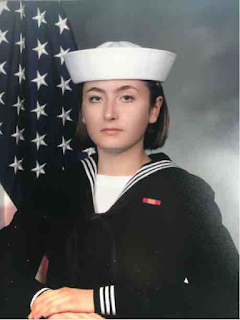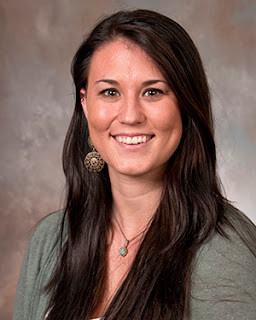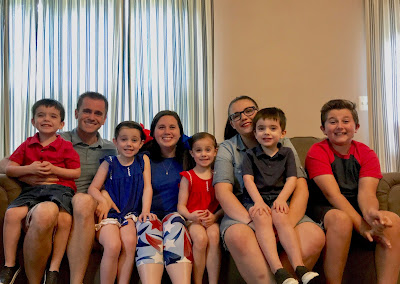USU Students Share COVID-19 Challenges, Triumphs, Perspectives
Edited by Vivian Mason
Just two days into our third clinical rotation, the Class of 2022 received an email saying that it was time to drop what we were doing and return to Bethesda. The threat of COVID-19 had been building over the past couple of months and had finally reached a tipping point. The week that ensued involved turning in our hospital badges, packing hurriedly, and making more than a few phone calls to the travel office.
Once we were all back, we found ourselves, as perfectly described by classmate 2nd Lt. Loxley Bennett, ‘in a world both frozen and ablaze at the same time.’ Amid shelf exams and a helpful five-week virtual course created by our clerkship directors, we survived this period with the help of [virtual] family calls, lots of walks, plenty of naps, and many newfound hobbies.
Even in the face of a global pandemic, the hospital was where the Class of 2022 wanted to be. Thanks to the strong leadership in the Office of Student Affairs (OSA), by the end of June, every single person in our class was back in military hospitals from Bethesda to Hawaii and everywhere in between. Although there was an element of uneasiness in returning to the hospital setting during COVID, I have personally been so blown away by the courage and resilience of my classmates. Clerkship year is already one of the toughest in medical school, and tossing in a pandemic definitely adds a level of intensity to each day and each patient interaction.
| Air Force 2nd Lt. Hannah Brink on her pediatrics rotation after rounding on the new moms and babies in the nursery at Walter Reed. [Image Credit: Courtesy of 2nd Lt. Hannah Brink] |
On top of that, due to travel restrictions, some of my classmates have been separated from their loved ones with no opportunity to see them. Because of necessary schedule changes, some students are missing out on selective rotations in specialties they’d like to pursue. However, regardless of the number of changes and challenges we have faced, we are still moving forward. As we navigate our fluid rotation schedules, we are mastering the art of going with the flow. We are learning how to make the most of whatever situation we find ourselves in, no matter how unexpected or sudden. Each trial we overcome is a step of growth toward our future role as military physicians.
We wouldn’t be able to do it without each other. Although we are scattered across the country, the Class of 2022 has truly stuck together. We phone each other when we need a friend, and we pick up groceries for each other if one of us gets stuck in quarantine. We cheer for each other on days when we get all of the attending’s questions right, and are still cheering for each other on the days when we miss them all. We remind one another that we have what it takes to succeed, and we also remind each other to grab our eye protection before heading off to see a patient. We send each other study guides to lighten the load and memes to lighten the mood.
Also, we wouldn’t be able to continue moving forward without the scores of people supporting our education. We are fortunate to be surrounded by incredible OSA leaders, clerkship and site directors, attendings, residents, interns, and fourth-year medical students. All of these individuals have been dedicated to helping us and teaching us during these often scary and unpredictable times.
For now, we are grateful to be in the hospital learning and serving our military members and their families. The changes and uncertainty are not over yet and probably won’t be for a long time, but the Class of 2022 will continue to press on together.
- Air Force 2nd Lt. Hannah Brink
School of Medicine, Class of 2022
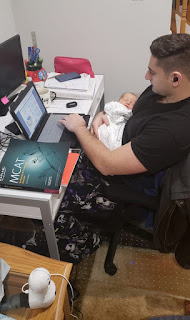 |
| Air Force Staff Sgt. Evio Jorge is balancing the needs of his family, while simultaneously studying from home during COVID-19. [Image Credit: Courtesy of Staff Sgt. Evio Jorge] |
I’m a new parent, and my son was born two weeks before spring classes. A month into the spring semester, COVID happened. I tried to create a makeshift office in my basement for studying using a patio chair and table. Trying to memorize and learn all I need to while dealing with a crying baby in the background is difficult. Often, my wife and I both have to wake up several times during the night to feed him, burp him, change diapers, and get him back to sleep. It’s definitely challenging. I’m really glad I went through this phase of parenting because I know a lot of fathers, especially in the military, don’t get this experience. Some don’t even get to meet their babies. I’m lucky. I got to see the first time he smiled and the first time he started crawling. As we continue distance learning, I’ll soon get to see his first steps, as well as many other milestones. Yes, it’s been difficult and it’s been tough, but I wouldn’t have it any other way. We just found out that my wife is pregnant. So, we get to do it all over again!
- Air Force Staff Sgt. Evio Jorge
EMDP2, Cohort 6, Class of 2021
I started my residency in June. Before that, I was a general dentist working at a clinic. We had to change our operation completely before the clinic was shut down. First of all, there was a delay in starting my residency. The incoming residents were not able to PCS in time or were being quarantined after arriving. There was a delayed start of our residencies for about two weeks. Then, we weren’t allowed to see patients from June until August.
We began seeing one patient per week around the end of August. By the beginning of September, we were seeing one patient per day. That was exciting even though we’re supposed to be seeing a lot more patients. The second-year students are now seeing about six patients per day.
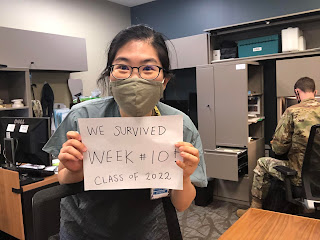 |
| USU Postgraduate Dental College student, Air Force Maj. Clarissa Kim, uses humor to make the best of the current pandemic situation. [Image Credit: Courtesy of Major Clarissa Kim] |
The number of patients we see changes depending on what procedures we can do. For instance, when we want to take the brackets off our patients, we limit doing that to a certain room, a certain time, how many are done per day, and we try not to use the air-water syringe. So we’re doing everything in a different way.
It has impacted us in a big way curriculum-wise, patient care-wise, and family-wise. I was recently promoted and was supposed to have a promotion ceremony, but that was cancelled, and my parents couldn’t come visit me. Everything is put on hold. There are still questions because we don’t know exactly how the pandemic is going to impact things in the long run. In orthodontics, patient care is around two years, and staff predicts that there’ll be more cases that we don’t finish from the start to the end of our residency because we’ll have to hand them down to the other classes.
- Air Force Major Clarissa Kim
Orthodontic Resident, Postgraduate Dental College, Class of 2022
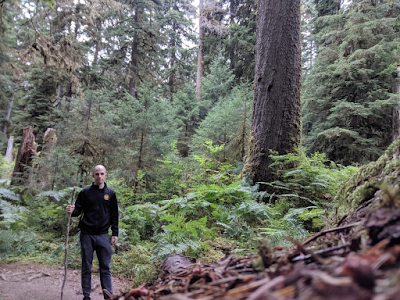 |
| USU Class of 2021 medical student, Air Force 2nd Lt. Jacob Altholz on a hike, pre-COVID-19. [Image Credit: Courtesy of 2nd Lt. Jacob Altholz] |
Being a student during COVID has been weird to say the least. Traveling across the country for rotations used to be fun. Now, it's stressful and involves a lot of planning and forethought, not to mention there’s the inability to fully enjoy where you are. So far, I've had an okay time adjusting, but the rules differ between locations. Soon, I'll be quarantining for the third time in about three months. Still, I'm grateful to be back in the clinics and hospitals. The original removal of medical students from the clinical environment was necessary, but it left me feeling a bit out of the game and disconnected.
It’s also difficult not being able to see or keep up with former hobbies. I used to go to art museums and the arcades to play pinball because they were fun and forms of stress release. I know it's better for me and everyone else to be social distancing and sheltering in place, but it’s entirely against my nature. It's also incredibly frustrating having to see and deal with so much misinformation regarding COVID. Right now, all I can do at the end of the day is to try and make the clinics and wards where I work more effective and efficient so that the healthcare system can shoulder this burden more effectively.”
- Air Force 2nd Lt Jacob Altholz
School of Medicine, Class of 2021
In the middle of the pandemic, my class transitioned from phase 1 to phase 2 sites all over the country. I had to PCS away from my wife during this time and was quickly quarantined once I got to Fort Bragg. That meant that I couldn’t do much of anything except pick up groceries. So, I lived in a hotel for about a month, taking classes online, studying for boards, and fighting cabin fever.
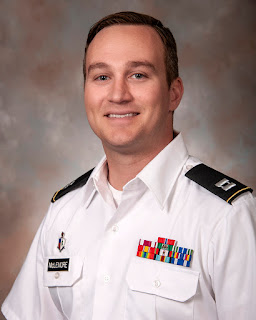 |
| Now-Army Maj. Paul McLemore overcame challenges related to moving duty stations in the midst of COVID-19. [Image Credit: Thomas Balfour, USU] |
I’m not new to the military, but this is my strangest PCS move to date. I didn’t know where I was going to live, and I couldn’t actively look for places. I couldn’t travel to see my wife, and she couldn’t travel to see me, as she is also active duty. All of my belongings were in Bethesda, and I couldn’t go and get them. I had to find a place on my own and arrange for them to be moved while most of the country was shut down. In hindsight, a do-it-yourself move in a pandemic was a poor choice.
Because of COVID, I see all of my patients remotely. Most days, I go into the office and see patients via video-calling software. At first it took some getting used to, but I’m currently seeing children who are amazingly well adapted to telehealth.
From a feelings perspective, I was both resentful and grateful. Resentful because many of the challenges made certain aspects of my life so difficult. Grateful because I was employed when so many people weren’t.
- Army Major Paul McLemore
Graduate School of Nursing, Psych Mental Health Nurse Practitioner program, Class of 2021
As a student, COVID-19 hasn’t really affected me as much, but I’ve noticed that my fellow classmates have been very resilient and flexible when it comes to learning. Because of COVID, we have had to make some adjustments to our learning curriculum, such as practice dining facility and pool inspections. Students in my program actually adjusted quite well to this bump in the road.
Personally, COVID has affected my ability to see my family, which has been very hard for me. However, social media and constant texting have allowed me to keep in touch with everyone.
- Navy Hospital Corpsman 3rd Class Kayley Newberry
College of Allied Health Sciences, Preventive Medicine Program
Fortunately, we were already in a virtually-pivoted module. So, it wasn’t too hard for us to adjust to the tremendous changes resulting from COVID. Something I think a lot of us are missing is travel, especially in terms of visiting family.
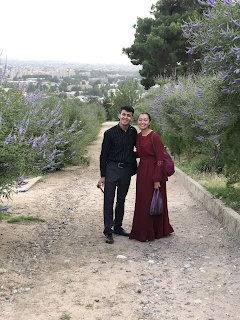 |
| Before COVID-19, Army 2nd Lt. Grace Covelli and a friend visited Tajikistan. [Image Credit: Courtesy of 2nd Lt. Grace Covelli] |
We know that all of the classes are going through tough times and have their own challenges. It was difficult seeing all of the opportunities that we were once looking forward to engaging in slowly knocked off one by one. The administration is doing its best to graduate us on time, and we’re many paces ahead of other medical schools. So, we really do appreciate all of these efforts to ensure that we get our education, graduate on time, do our clerkships, etc. But, it’s still hard. Fortunately, we have each other, and our class is pretty close with all of our fire teams and fire families. Our class infrastructure is strong. Students know that they aren’t going through any of this alone. These are shared struggles.
All of this ‘virtualness’ hit me in July. I bought a pair of blue light glasses [which help prevent eye strain and blurry vision] because I’m on the computer so much, and I was getting headaches. Another thing I had to do was to buy a desktop computer. It was really hard watching lectures and taking notes on the same screen. My laptop caused my back to hurt from hunching over it so much. I think other classmates ran into that problem, too. So, I bought a big screen and a separate keyboard.
One of the hardest transitions for me was studying from home. I used to study in coffee shops and at the library. I didn’t have a desk at home. I thought really hard about what would matter to me in a workspace. So now I face a wall for minimum distraction, have a ton of plants, and am privy to a nearby balcony for breaks and fresh air. Some classmates already had workspaces set up at home; however, now their study lives are complicated by children in that same space.
Yes, these are trying times. Yes, it’s been quite difficult and demanding. The human spirit is magnificent, and progress toward a safe recovery from COVID is being made every day. Soon, hopefully, we’ll wake up to normalcy once again.
- Army 2nd Lt. Grace Covelli
School of Medicine, Class of 2023
As a grad student, I work from home a lot. I’m in my fourth year, and a lot of my time is spent working on my dissertation, doing research, and writing. The remainder of my time is spent doing clinical work. For me, and I would suspect a lot of other students in the department, the biggest change since COVID has been switching to delivering telehealth for our clinical sites. So, I’m working at home in a 500-square-foot studio doing psychotherapy with VA patients. Being able to get them access to care is important, but not having a separate office space in which to work is tough. Normally, I’d do all my research and writing in coffee shops, but I can’t really do that anymore.
Also, it’s been really difficult not being able to see and interact with my classmates. It’ll be especially hard because this is our last year before we go onto our internships, and we really won’t be able to see one another very much. So, that’s kind of sad.
I’ve just been trying to look for the silver linings with this situation, such as learning new skills, not having long commutes, and talking more with friends and family.
- Larissa Tate, MS, MPS
School of Medicine Graduate Program, Department of Medical and Clinical Psychology, Class of 2022
The pandemic has offered me a time to reflect on the things that matter most in my life. I have found more time to spend with my wife and six kids, more time to read books that I have been putting off, and gained a renewed focus on getting my finances in order. The shutdown has brought a new set of challenges, but I am learning through them.
Classes became more difficult to manage when we went online. I found myself coming to the computer just in time for the lecture, usually in the clothes I slept in. Since I had all the time in the world, I found myself with too many excuses and promises of studying the material some other time. At the end of the lecture, I was so overly stimulated that I couldn’t find the brain power to push on and study the material I had just received. These thoughts of postponed study became facilitated by the many distractions so prevalent in a large, busy household of eight people.
At first, I was not very comfortable with online learning platforms or familiar with video conferencing. I struggled to focus during video-streamed lectures and took for granted the interpersonal connection that happens when classmates are face to face.
I had to adapt, and I continue to overcome these challenges. I now have a new internal motivation to learn and grow. I’ve learned to better manage my life, spend more quality time with my children, study and understand the coursework being presented, add exercise to my schedule, and make my health a priority.
Six months ago, my schedule was made for me, I knew that I had to get up at a certain time to be able to get things done. Now, I’ve had to learn what to do that will work for me and my family. So, I have taken charge to make my life a success. I’m stronger now, and I’m thankful for the opportunity that this shutdown has provided. I’m a different person because of it and better prepared for the new future.
- Army Sergeant Scott Clawson
EMDP2, Cohort 6, Class of 2021
 |
| EMDP2 student Navy Petty Officer Alexius Russell and her brother, also in the Navy, share some time together pre-COVID-19. [Image Credit: Courtesy of IC2 Alexius Russell, U.S. Navy, USU |
When we went into quarantine, it was right after spring break. Initially, I was a little flustered because I learn better in a classroom environment. It was stressful because it was a difficult semester. We had Biochemistry plus a lab, Biostatistics, Physics II plus a lab, and our MCATs to study for. My routine consisted of waking up 5 a.m. and finishing around 1 a.m. the next day. Once I adjusted to this schedule, it really worked out well.
For me, COVID wasn’t such a negative thing because it gave me time to really study and hone in on any issues I was having and address them. COVID worked out for me by allowing me to help other people, too. I actually had time to tutor and mentor students in a large study group. It was a very unexpected, but rewarding experience.
- Navy Interior Communications Electrician 2nd Class Alexius Russell
EMDP2, Cohort 6, Class of 2021
I was in Landstuhl, Germany when the pandemic happened. I was completing a 10-week Family Practice rotation. However, it was cut short when I received a phone call in the middle of the night, and I was on a plane less than six hours later. As soon as I landed, I was instructed to go directly into quarantine for 14 days. This was a dilemma for me because I flew out of Atlanta where I left my dogs for the 10 weeks that I was away. So, in the middle of the night, I had to figure out how I was going to get home, get my dogs, and follow orders. I ended up changing my flight to land in D.C., which resulted in my parents driving 10 hours to drop off my dogs.
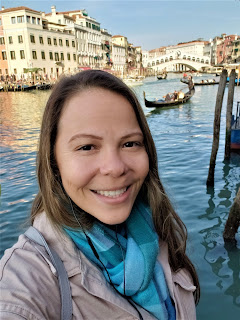 |
| Army Capt. Tonesha Sorrell visited Venice, Italy, before almost being quarantined in Germany at the start of the pandemic. [Image Credit: Courtesy of CPT Tonesha Sorrell, U.S. Army, USU] |
After returning from my rotation, I had about 20 days before the end of my lease and was to PCS when the Army issued the Stop Movement Order. Naturally, this was extremely stressful to try and adjust all the PCS arrangements that had been made. I struggled to get an extension on my lease to the point where I was going to have to move my own household. Luckily, two days before my move-out date, the new tenants agreed to stay in their apartment for 30 more days. I feel that many students all across the country had similar issues going on. Luckily, I was PCSing to Fort Bragg. But just about every house that I looked at and put a deposit on fell through, and I lost a lot of money. COVID had a lot of people either scurrying to find a place to live or taking their homes off the market because of a PCS delay. It was very, very challenging to try and find housing. I finally found a place that had been on the market for only three hours. I rented it sight unseen. I found the home on a Friday and had to start work the following Monday. I in-processed, but halfway in I had to quarantine again. So, everything got set back.
I attended military training for Mountain Medicine in Vermont. But, we had to quarantine 14 days prior to going. Later, I arrived home and had to quarantine another 14 days. I missed four weeks of work. Fewer people are doing training now because of all the quarantining requirements.
Will it still be that strict in January 2021? What’s on my mind now is the fact that we might not have a graduation this year. And, if that’s not enough, the pandemic is putting a significant strain on my relationship with my boyfriend. We live far away from one another, and I’m not allowed to leave my duty station. But, I’m sure I’m not alone in this situation. It’s tough for everyone.
- Army Capt. Tonesha Sorrell
Graduate School of Nursing, Family Nurse Practitioner Program, Class of 2021

![USU Postgraduate Dental College student, Air Force Maj. Clarissa Kim, uses humor to make the best of the current pandemic situation. [Image credit: Courtesy of Major Clarissa Kim] Clarissa Kim](https://1.bp.blogspot.com/-ugkmgoiGyMk/X3smfrAQ9vI/AAAAAAAAAvE/lOmca1CcFF0MPt-Y26GYVVCczB_PTBRTQCLcBGAsYHQ/w640-h480/Maj%2BClarissa%2BKim.jpg)
